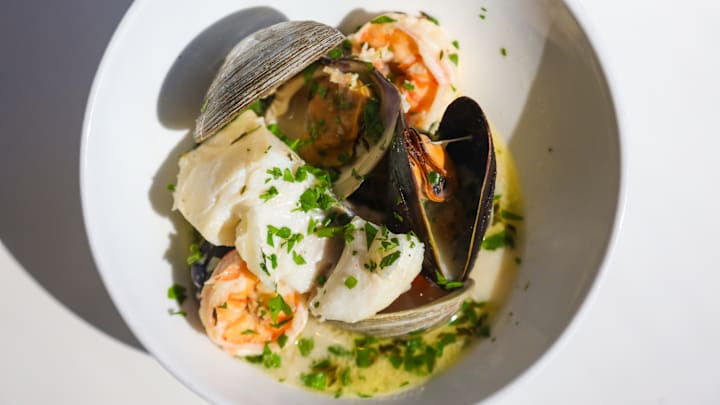Rich, creamy soups are normally associated with cozy winter days indoors. That’s not the case with clam chowder. The New England speciality is just as satisfying in cold weather as it is after a long day sunbathing on the beach. The addition of fresh seafood makes it one of the rare soups that’s appropriate for summer. This version from the Institute of Culinary Education puts a spin on the classic recipe. Rather than spotlighting clams alone, it adds mussels, shrimp, and white fish to the mix, making it the perfect vehicle for a summer seafood bounty.
To make the soup, begin as if you’re making a straightforward New England clam chowder. Heat butter and oil together in a heavy-bottomed pot, then add herbs and diced onion and cook over low heat. Add the diced potatoes and seafood stock (chicken stock or water also works in a pinch) and boil for about 10 minutes. “You cook them until those chunks of potatoes are just soft on the outside but still a little firm on the inside,” Roger Sitrin, lead recreational chef-instructor for ICE, tells Mental Floss. “How do you know that? You take a paring knife and you poke. Your knife should go quickly through the outside but meet with a little bit of resistance in the middle.”
After par-boiling your potatoes, add the seafood in batches, starting with the clams and mussels first, then the shrimp, and finally adding the fish at the end. The recipe calls for cod or haddock, but any hearty white fish will work. Finish the chowder by stirring in milk and seasoning to taste.
If you bought too much fish for your seafood boil, this recipe is a great way to use it up. It can also be made ahead of time, making it a great option if you’re looking to feed a beach house full of people over the weekend. “It really is a complete dinner in a bowl,” Sitrin says. “I’ve had it in the summer, I’ve had it in the winter. It’s a great thing to have at the beach, it serves a lot of people. Get yourself a nice crusty bread with that and you’re good to go.”
With campuses on the east and west coasts, the Institute of Culinary Education is one of the largest schools of its kind. If you’re interested in learning more about their classes in the culinary arts, pastry arts, and hospitality and hotel management, check out their course curricula here.
New England Fish Chowder
Serves 8
2 tablespoons unsalted butter
2 tablespoons cooking oil like canola
2 medium onions (14 ounces), cut into 3/4-inch dice
6 to 8 sprigs fresh thyme, leaves removed
2 dried bay leaves
2 pounds Yukon Gold, 3/4-inch dice
5 cups fish stock
24 PEI mussels, bearded, sorted, and rinsed
24 cherrystone or little neck clams, sorted and rinsed
1 pound medium shrimp, cleaned, shells and tails removed
2 pounds skinless haddock or cod fillets, preferably over 1 inch thick, pin bones removed, cut into 3-inch square chunks
1 1/2 cups whole milk
2 tablespoons chopped fresh Italian parsley
2 tablespoons minced fresh chives
Kosher or sea salt and freshly ground black pepper
- Heat a 6- to 8-quart heavy pot over low heat and add the butter and oil.
- Add onions, thyme, and bay leaves to the pot and sauté, stirring occasionally with a wooden spoon, for about 8 minutes, until the onions are softened but not browned.
- Add the potatoes and stock. If the stock doesn’t cover the potatoes, add just enough water to cover them. Turn up the heat and bring to a boil, cover, and cook the potatoes vigorously for about 10 minutes, until they are soft on the outside but still firm in the center. Reduce the heat to low and season with salt and pepper.
- Add the clams and the mussels. Cover and allow to cook for about 5 minutes until the shells start to open. Next, add the shrimp and cook another 4 minutes. Finally, add the fish and cook over low heat for 5 minutes, then remove the pot from the heat and allow the chowder to sit for 10 minutes (the fish will finish cooking during this time).
- Gently stir in the milk and add salt and pepper to taste. If you are not serving the chowder within the hour, let it cool a bit, then refrigerate; cover the chowder after it has chilled completely. Otherwise, let it sit for up to an hour at room temperature, allowing the flavors to meld.
- When ready to serve, reheat the chowder over low heat; don’t allow it to boil. Ladle into bowls and garnish with fresh chopped herbs.
